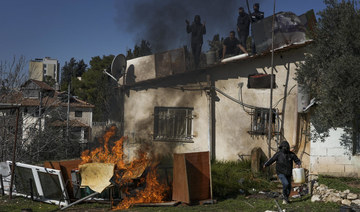JERUSALEM: Few places in Jerusalem speak of the larger conflict being waged over the city more than the apartment of 68-year-old Nora Ghaith-Sub Laban.
As the last remaining Palestinians in a building filled with Israeli settlers, the Ghaith-Sub Labans have battled Israeli attempts to evict them from their Old City home for over 45 years.
That labyrinthine legal battle ended earlier this year, when the Israeli Supreme Court struck down the family’s final motion for an appeal. Now, Israeli authorities have ordered the eviction of Nora and her husband Mustafa to take place by July 13. That includes one of the biggest holidays of the Islamic calendar, Eid Al-Adha, which began Tuesday night.
“I can’t sleep, I can’t eat,” Nora said from the apartment where she was born in 1955. From the outside, with its rough-hewed stones flattered by brilliant sunlight and its windows overlooking the golden Dome of the Rock, the 200-year-old home in the heart of the Muslim Quarter is a Jerusalem postcard. Inside, the paint has chipped and walls have peeled due to court orders barring the family from doing repairs.
In what she described as a campaign to make life so unbearable that she would simply leave, Nora said her Jewish neighbors spit and hurl stones and bottles at her. Israeli police turn up at her door, asking for IDs and demanding to know everyone who has passed in and out of her home.
“This is psychological war,” she said.
The Israeli police said the check-ins were “not meant to intimidate or harass but to gather the necessary information” ahead of the eviction.
The Ghaith-Sub Laban case is not a dispute over a single property, advocates say, but part of a wider effort by Israeli settlers, with government backing, to cement Jewish control over the contested city, especially the Old City, home to Jerusalem’s most important holy sites.
A similar dispute that could lead to evictions of Palestinian families in the nearby neighborhood of Sheikh Jarrah stirred tensions that built up to a 2021 war between Israel and the Hamas militant group in Gaza that killed over 250 people.
The family’s struggle has sparked numerous protest rallies by Israeli left-wing activists, some of which have spiraled into scuffles with Israeli police who have arrested those waving Palestinian national flags.
“It’s more than just, ‘Oh, I have this problem with my neighbor downstairs.’ You are talking about a political and national conflict,” said Yonatan Mizrahi, the settlement watch director at Peace Now, an Israeli advocacy group that opposes settlements. “What happens in the Old City does not stay in the Old City.”
Captured by Israel in the 1967 Mideast war and later annexed in a move not internationally recognized, east Jerusalem has long been a crucible in the Israeli-Palestinian conflict.
Today, more than 220,000 Jews live in east Jerusalem, largely in built-up settlements that Israel considers neighborhoods of its capital. Most of east Jerusalem’s 350,000 Palestinian residents are crammed into overcrowded neighborhoods where there is little room to build.
Across the city’s eastern half, settler organizations and Jewish trusts are pursuing court battles against Palestinian families to clear the way for settlers.
An Israeli law passed after the annexation of east Jerusalem allows Jews to reclaim properties that were Jewish before the formation of the Israeli state in 1948. Jordan controlled the area between 1948 and the 1967 war.
Nearly 1,000 Palestinians, including 424 children, currently face eviction in east Jerusalem, the United Nations humanitarian office said.
During British rule over historic Palestine, before the war over Israel’s creation, the Ghaith-Sub Laban apartment was owned by a trust for Kollel Galicia, a group that collected funds in Eastern Europe for Jewish families in Jerusalem. Its legal representative, Eli Attal, declined to comment on the case, sending only an emoji with its mouth taped shut.
Arieh King, a settler leader and deputy mayor of Jerusalem, described the Ghaith-Sub Laban family as “squatters” and the case as a straightforward real estate dispute.
“It’s Jewish property and they want it back,” he said. “(The Ghaith-Sub Labans) don’t have any right to this property.”
There is no equivalent right in Israel for hundreds of thousands of Palestinians who fled or were forced from their homes during the war surrounding Israel’s establishment to return to lost properties.
Nora’s case reflects the city’s volatile history. Hailing from the southern Palestinian city of Hebron, her parents moved to west Jerusalem in 1945, then to the Old City when the capital was divided in the 1948 war.
As residents of the same Muslim Quarter apartment for seven decades, Nora’s family gained the status of protected tenants, putting Israeli law on their side.
Nora shared with The Associated Press her Jordanian rental contract from 1953 that showed that she and Mustafa paid rent to a “General Custodian” for abandoned properties, first under Jordanian authorities and then under Israel after the 1967 war. She now pays rent — 200 Jordanian dinars, or $282 each year — to the lawyers of the Jewish trust.
The case has dragged on for decades, as the Israeli custodian and then the Kollel Galicia trust contested the family’s protected tenancy. Most recently, the Kollel Galicia endowment argued in 2019 that Nora’s absence from her house that year could clear the way for their eviction.
Nora said the house was empty at times in 2019 because she was hospitalized with a back injury and later recovered in the houses of her adult children, whom Israeli authorities had previously expelled from the Old City apartment.
Israel’s Supreme Court upheld the eviction order in late February, ending the saga that has subsumed almost her entire life and the lives of her five children. Two of her sons — Ahmad, a human rights researcher, and Rafat, a lawyer — have become full-time advocates for the case.
The Israeli police said that authorities “understand the emotions involved” but are “dedicated to upholding the rule of law” and enforcing the eviction.
Now in limbo, Nora feels her house has become a prison cell. Worried the settlers will seize on even a momentary absence to move in, she said she hasn’t stepped outside since May. Her windows — and their breath-taking view of the golden shrine — are covered with wire mesh to protect against her neighbors’ stones.
Last week, supporters and artists helped the family prepare their home for its future guests. They painted an olive tree in the living room with the words “We will remain,” written in its wild roots. There is a portrait of Nora, too, with her wire-rimmed glasses and careful smile.
“They don’t want peace, they want surrender,” she said.
As a lengthy legal battle ends, a Palestinian family braces for eviction from Jerusalem home
https://arab.news/prj58
As a lengthy legal battle ends, a Palestinian family braces for eviction from Jerusalem home
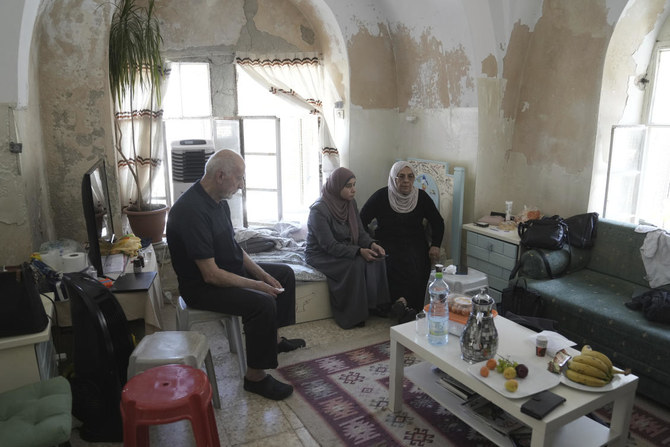
- The Ghaith-Sub Labans have battled Israeli attempts to evict them from their Old City home for over 45 years
Sudan facing ‘inferno’ of violence, crushing aid holdups: UN

- The grim situation is only expected to worsen
United Nations, US: Residents of conflict-hit Sudan are “trapped in an inferno of brutal violence” and increasingly at risk of famine due to the rainy season and blocked aid, the UN’s humanitarian coordinator for the country warned Wednesday.
Tens of thousands of people have died and millions have been displaced since war broke out in April 2023 between the army and the paramilitary Rapid Support Forces (RSF).
“Famine is closing in. Diseases are closing in. The fighting is closing in and there’s no end in sight,” Clementine Nkweta-Salami told a press conference.
The grim situation is only expected to worsen, with “just six weeks before the lean season sets in, when food becomes less available, and more expensive.”
Noting that more than four million people are facing potential famine, Nkweta-Salami added that the onset of the country’s rainy season means that “reaching people in need becomes even more difficult.”
The area’s planting season also “could fail if we aren’t able to procure and deliver seeds for farmers,” she said.
And “after more than a year of conflict, the people of Sudan are trapped in an inferno of brutal violence.”
“In short, the people of Sudan are in the path of a perfect storm that is growing more lethal by the day,” Nkweta-Salami warned, adding that the humanitarian community needs “unfettered access to reach people in need, wherever they are.”
The United Nations has expressed growing concern in recent days over reports of heavy fighting in densely populated areas as the RSF seeks control of El-Fasher, the last major city in the western Darfur region not under its control.
“Right now the humanitarian assistance they rely on can’t get through,” Nkweta-Salami said.
More than a dozen UN trucks loaded with medical equipment and food, which left Port Sudan on April 3, have still not reached El Fasher, she said, “due to insecurity and delays in getting clearances at checkpoints.”
Israel PM says no humanitarian crisis as hundreds of thousands flee Rafah

RAFAH, Palestinian Territories: Israeli Prime Minister Benjamin Netanyahu on Wednesday insisted there was no “humanitarian catastrophe” in Rafah, even as hundreds of thousands fled the south Gaza city amid intense fighting.
Hamas meanwhile insisted it would take part in any decision on the post-war government of Gaza as Palestinians marked the 76th anniversary of the “Nakba,” when around 760,000 Palestinians fled or were driven from their homes during the 1948 creation of Israel.
Israeli forces have bombed Hamas militants around Gaza’s far-southern city of Rafah, but clashes have also flared again in northern and central areas which Israeli troops first entered months ago.
The upsurge in urban combat has fueled US warnings that Israel, which launched its war after the October 7 Hamas attacks, risks being bogged down in years of counterinsurgency.
But despite previous threats by US President Joe Biden to withhold some arms deliveries over Netanyahu’s insistence on attacking Rafah, his administration informed Congress on Tuesday of a new $1 billion weapons package for Israel, official sources told AFP.
The European Union urged Israel to end its military operation in Rafah “immediately,” warning failure to do so would “inevitably put a heavy strain” on ties with the bloc.
But even as he announced that hundreds of thousands had been “evacuated,” Netanyahu insisted there was no humanitarian crisis in Rafah.
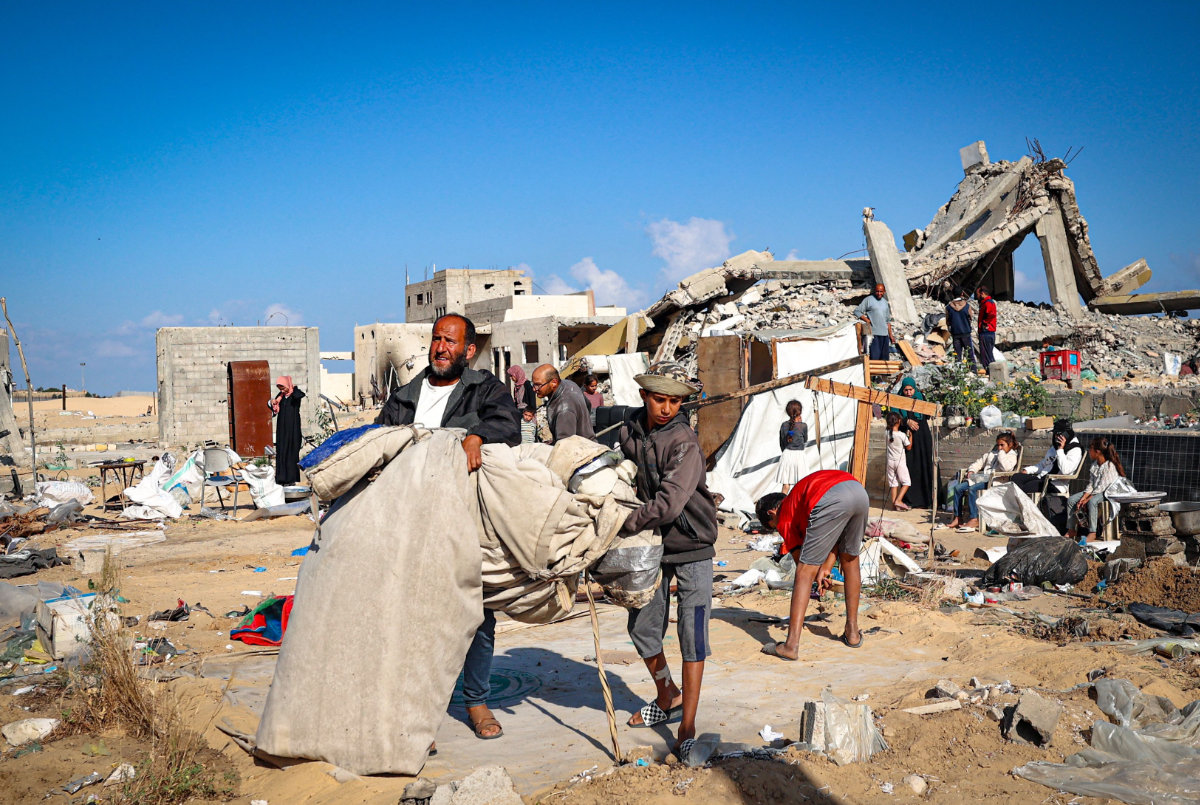
“Our responsible efforts are bearing fruit. So far, in Rafah, close to half a million people have been evacuated from the combat zones. The humanitarian catastrophe that was spoken about did not materialize, nor will it,” he said.
The United Nations agency for Palestinian refugees, UNWRA, meanwhile said “600K people have fled Rafah since military operations intensified.”
Nakba Day
The sight of desperate families carrying scant belongings through the ruins of war-scarred Gaza cities has evoked for many the events of the 1948 Nakba which translates from Arabic as “catastrophe.”
Hamas declared in a Nakba Day statement that “the ongoing suffering of millions of refugees inside Palestine and in the diaspora is directly attributed to the Zionist occupation.”
Hamas chief Ismail Haniyeh insisted meanwhile that the militant movement will be involved in deciding post-war rule in Gaza along with other Palestinian factions.
“We say that the Hamas movement is here to stay ... and it will be the movement and all national (Palestinian) factions who will decide the post-war rule in Gaza,” Haniyeh said in a televised address for Nakba.
He also said the fate of truce talks was uncertain because of Israel’s “insistence on occupying the Rafah crossing and on its expansion of the aggression” in the Palestinian territory.
“Any agreement must ensure a permanent ceasefire, comprehensive withdrawal (of Israeli forces) from all sectors of the Gaza Strip, a real deal for exchange of prisoners, the return of displaced persons, reconstruction and lifting the siege” of Gaza, Haniyeh said.
Thousands marched to mark the day in cities across the Israeli-occupied West Bank, waving Palestinian flags, wearing keffiyeh scarves and holding up symbolic keys as reminders of long-lost family homes.
Netanyahu has vowed to destroy Hamas and bring home hostages still held in Gaza.
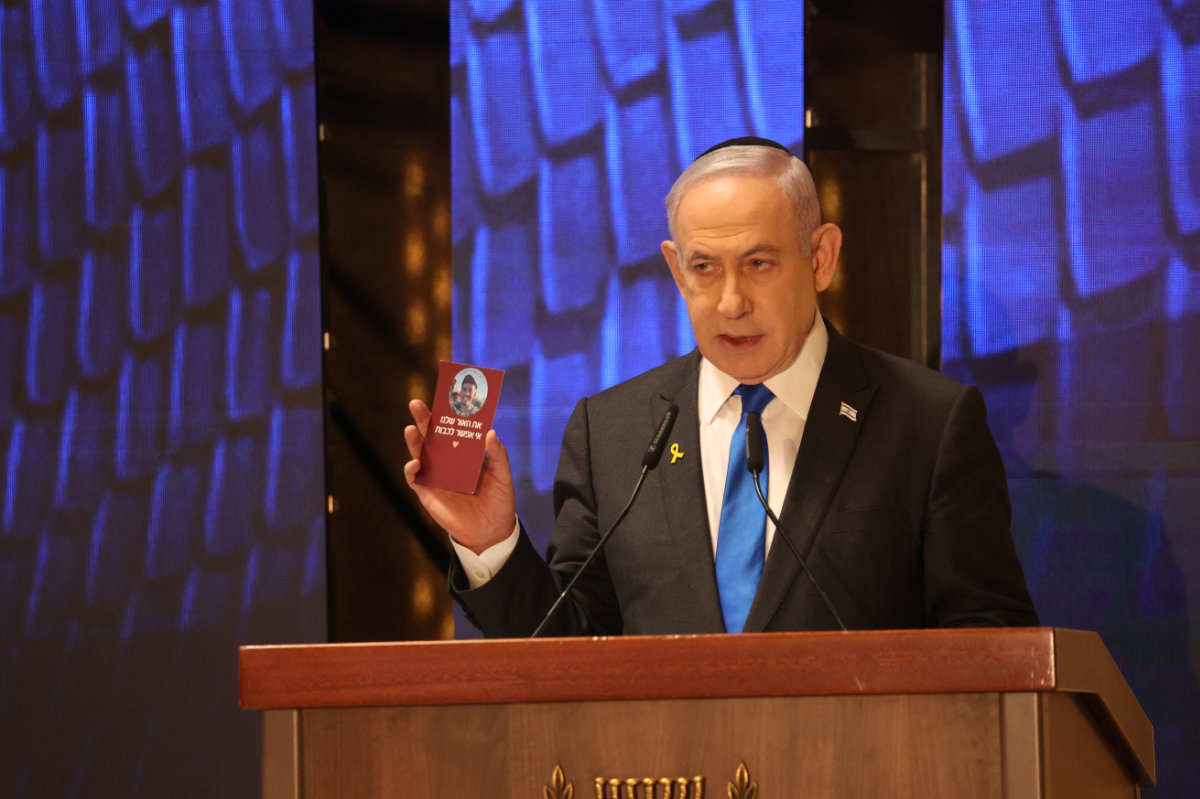
The United Nations agency for Palestinian refugees, UNWRA, meanwhile said “600K people have fled Rafah since military operations intensified.”
In a Wednesday interview with CNBC, Netanyahu addressed the tensions with Biden over the offensive, saying: “Yes, we do have a disagreement on Gaza. Rather, on Rafah. But we have to do what we have to do.”
Washington has also repeatedly urged Israel to work on a post-war plan for Gaza and supports the goal of a two-state solution, which Netanyahu and his far-right allies strongly oppose.
US State Department spokesman Vedant Patel said without a political plan, Palestinian militants “will keep coming back” trapping all sides in “this continued cycle of violence.”
Israeli Defense Minister Yoav Gallant on Wednesday said he would “not agree to the establishment of an Israeli military administration in Gaza, Israel must not have civilian control over the Gaza Strip.”
The war broke out after Hamas’s October 7 attack on southern Israel which resulted in the deaths of more than 1,170 people, mostly civilians, according to an AFP tally of Israeli official figures.
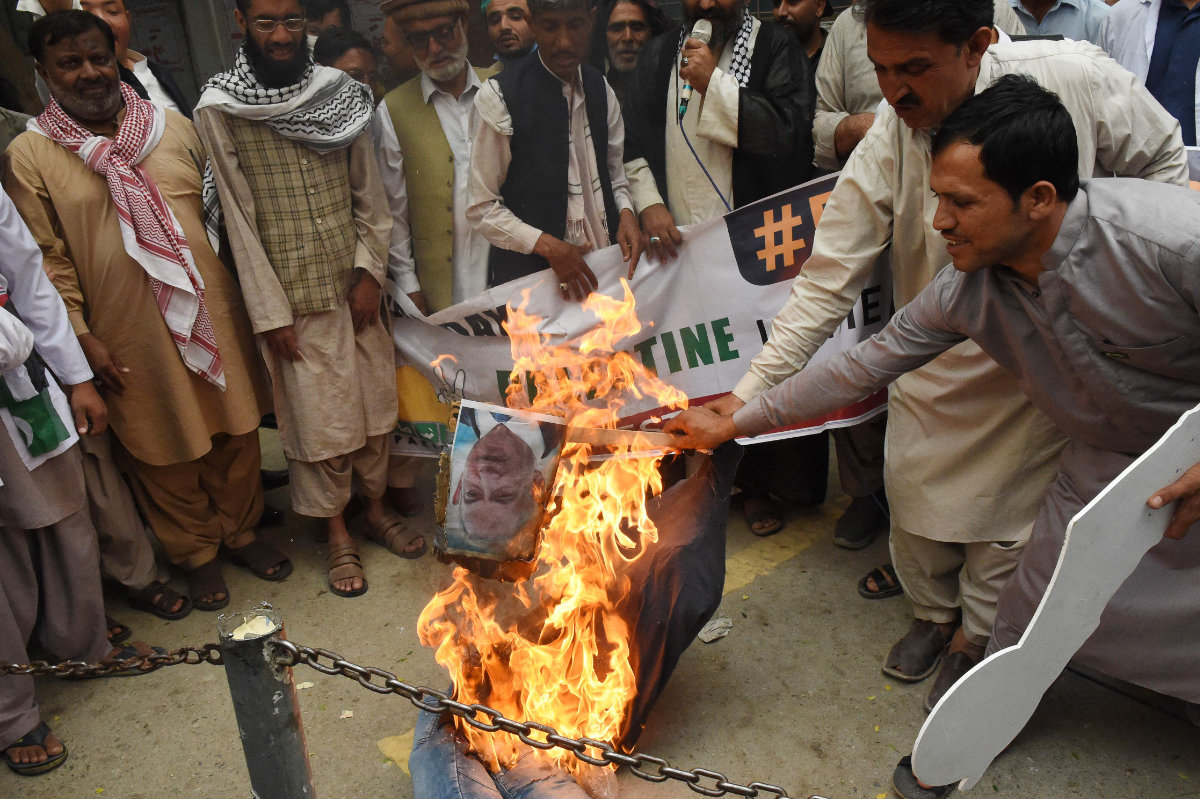
The militants also seized about 250 hostages, 128 of whom Israel estimates remain in Gaza, including 36 the military says are dead.
Israel’s military retaliation has killed at least 35,233 people, mostly civilians, according to the Gaza health ministry, and an Israeli siege has brought dire food shortages and the threat of famine.
Clashes continue
The Israeli military said Wednesday its aircraft had “struck and eliminated approximately 80 terror targets” including military compounds, missile launchers and weapons depots.
It also reported battles in eastern Rafah and in Jabalia in northern Gaza, where it said it had killed militants, adding troops were also fighting in the Zeitun area.
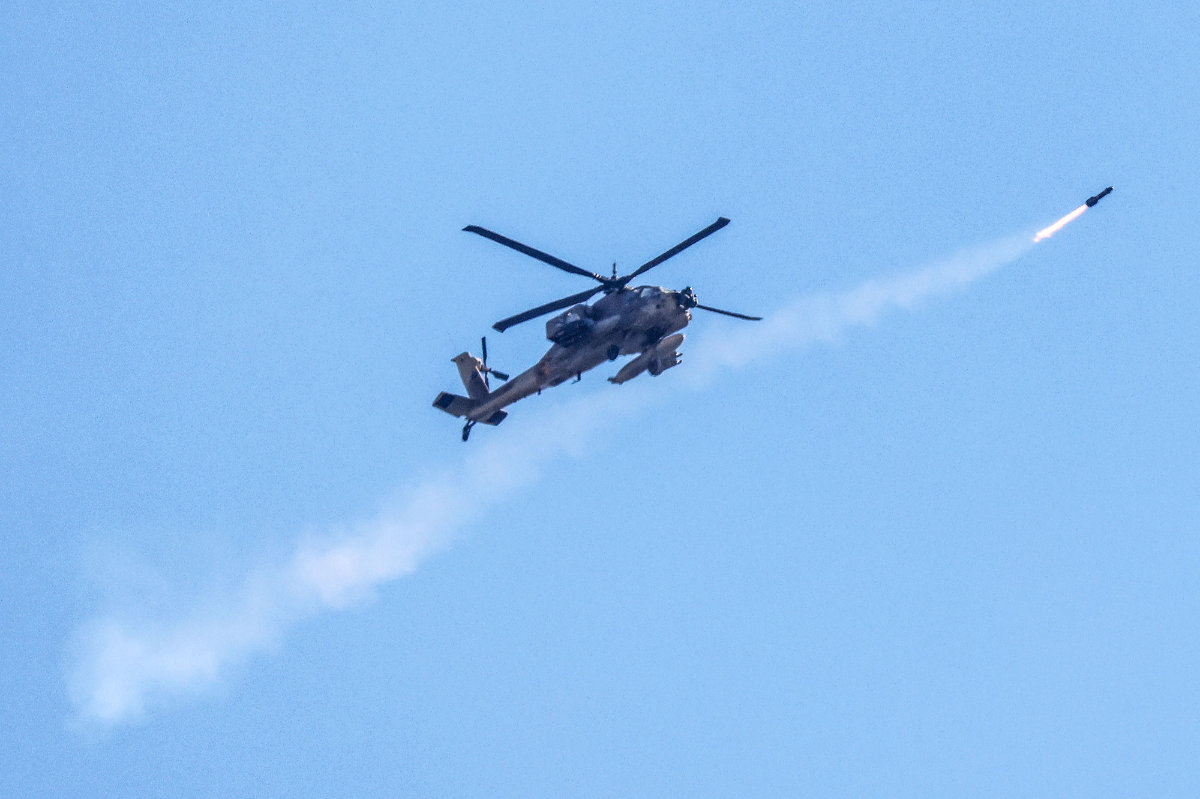
Hamas’s armed wing also reported its fighters were clashing with troops in the Jabalia area, much of which has been reduced to rubble.
At least five people were killed, including a woman and her child, in two Israeli air strikes on Gaza City overnight, Gaza’s civil defense agency said.
At the city’s Al-Ahli hospital, a wounded man, his bare chest smeared with blood, lay on a cot while outside several men placed a shrouded corpse in the shade of a tree.
Sporadic aid deliveries into Gaza by truck have slowed to a trickle since Israeli forces took control of the Gaza side of the Rafah crossing with Egypt last week.
A UK delivery of 100 tons of temporary shelter kits left Cyprus Wednesday on its way to a US-built pier in Gaza, Britain said.
Another convoy carrying humanitarian relief goods was ransacked by Israeli right-wing activists on Monday after it had crossed from Jordan through the West Bank.
Palestinians: Our ‘Nakba’ in 2023 is worst ever

- Thousands protest in West Bank, waving Palestinian flags, wearing keffiyeh scarves and holding up symbolic keys as reminders of long-lost family homes
GAZA: As the Gaza war raged on, Palestinians on Wednesday marked the anniversary of the Nakba, or “catastrophe,” of mass displacement during the creation of the state of Israel 76 years ago.
Thousands marched in cities across the Israeli-occupied West Bank, waving Palestinian flags, wearing keffiyeh scarves and holding up symbolic keys as reminders of long-lost family homes.
Inside the besieged Gaza Strip, where the Israel-Hamas war has ground on for more than seven months, scores more died in the fighting sparked by the Hamas attack of Oct. 7.
“Our ‘Nakba’ in 2023 is the worst ever,” said one displaced Gaza man, Mohammed Al-Farra, whose family fled their home in Khan Younis for the coastal area of Al-Mawasi.
“It is much harder than the Nakba of 1948.”
Palestinians everywhere have long mourned the events of that year when, during the war that led to the establishment of Israel, around 760,000 Palestinians fled or were driven from their homes.
But 42-year-old Farra, whose family was then displaced from Jaffa near Tel Aviv, said the current war is even harder.
“When your child is accustomed to all the comforts and luxuries, and suddenly, overnight, everything is taken away from him ... it is a big shock.”
Thousands marched in the West Bank city of Ramallah, as well as in Nablus, Hebron and elsewhere, carrying banners denouncing the occupation and protesting the war in Gaza.
“There’s pain for us, but of course more pain for Gazans,” said one protester, Manal Sarhan, 53, who has relatives in Israeli jails that have not been heard from since Oct. 7. “We’re living the Nakba a second time.”
Commemorations and marches — held a day after Israel’s Independence Day — come as the Gaza war has brought a massive death toll and the forced displaced of most of the territory’s 2.4 million people.
A devastating humanitarian crisis has plagued the territory, with the UN warning of looming famine in the north.
US working to get American doctors out of Gaza, White House says

- “We’re tracking this matter closely and working to get the impacted American citizens out of Gaza,” Jean-Pierre said
- The Biden administration has been warning Israel against a major military ground operation in Rafah
WASHINGTON: The Biden administration is working to get US doctors out of Gaza, White House Press Secretary Karine Jean-Pierre said on Wednesday, as fighting intensified in the seaside enclave.
A group of American doctors from the Palestinian American Medical Association told the Washington Post this week that they were stuck in Gaza after Israel closed the border crossing in the southern city of Rafah.
“We’re tracking this matter closely and working to get the impacted American citizens out of Gaza,” Jean-Pierre said.
Jean-Pierre said the United States was engaging directly with Israel on the matter.
The Biden administration has been warning Israel against a major military ground operation in Rafah, but Jean-Pierre said efforts to get the doctors out are continuing regardless of what happens there.
“We need to get them out. We want to get them out and it has nothing to do with anything else,” she said.
Israeli troops battled militants across Gaza on Wednesday, including in Rafah, which had been a refuge for civilians, in an upsurge of the more than 7-month-old war that has killed tens of thousands of Palestinians.
Gaza’s health care system has essentially collapsed since Israel began its military offensive there after the Oct. 7 cross-border attacks by Palestinian Hamas militants on Israelis.
Humanitarian workers sounded the alarm last week that the closure of the Rafah and Kerem Shalom crossings into Gaza could force aid operations to grind to a halt.
The Israeli assault on Gaza has destroyed hospitals across Gaza, including Al Shifa Hospital, the Gaza Strip’s largest before the war, and killed and injured health workers.
Egypt warns against consequences of Israeli escalation in Gaza

- During talks with Ayman Al-Safadi and Fuad Hussein, FM Shoukry said that there would be negative repercussions for regional stability if Israel continued to escalate its activities in Gaza
- Discussions in Manama took place on the sidelines of an Arabian foreign ministers’ meeting being held in preparation for the Arab Summit
CAIRO: Egypt’s Foreign Minister Sameh Shoukry has warned of dire consequences as a result of Israel escalating its activities in the Gaza Strip.
During talks with his Jordanian and Iraqi counterparts, Ayman Al-Safadi and Fuad Hussein, he also said there would be negative repercussions for the security and stability of the whole region.
The discussion in Manama on Wednesday took place on the sidelines of an Arabian foreign ministers’ meeting being held in preparation for the Arab Summit.
Shoukry talked about Egypt’s efforts to reach an immediate, comprehensive and lasting ceasefire in Gaza and its call for allowing immediate delivery of humanitarian aid.
He also stressed his country’s categorical rejection of any attempts to displace Gazans or kill the Palestinian cause.
He underlined the need to stop targeting civilians, halt Israeli settler violence, and allow aid access in adequate quantities “that meet the needs of our Palestinian brothers.”
During the meeting, Shoukry also reaffirmed Cairo’s support for the stability of Iraq and Jordan and emphasized the importance of implementing directives from the three countries’ leaders to boost cooperation within the framework of the tripartite mechanism.
He said Egypt viewed tripartite cooperation as a way to link the interests of the three countries and maximize common benefits. The discussion also underlined the importance of putting into effect agreed joint projects as soon as possible.
During a separate meeting with Iraqi minister Hussein, Shoukry reiterated the directives of President Abdel Fattah El-Sisi to develop relations between the two countries in various fields.
The Iraqi minister highlighted close historical ties with Egypt that required continued coordination on the various challenges plaguing the region. Hussein also hailed the key role played by Egypt to bring about an end to the crisis in Gaza.




